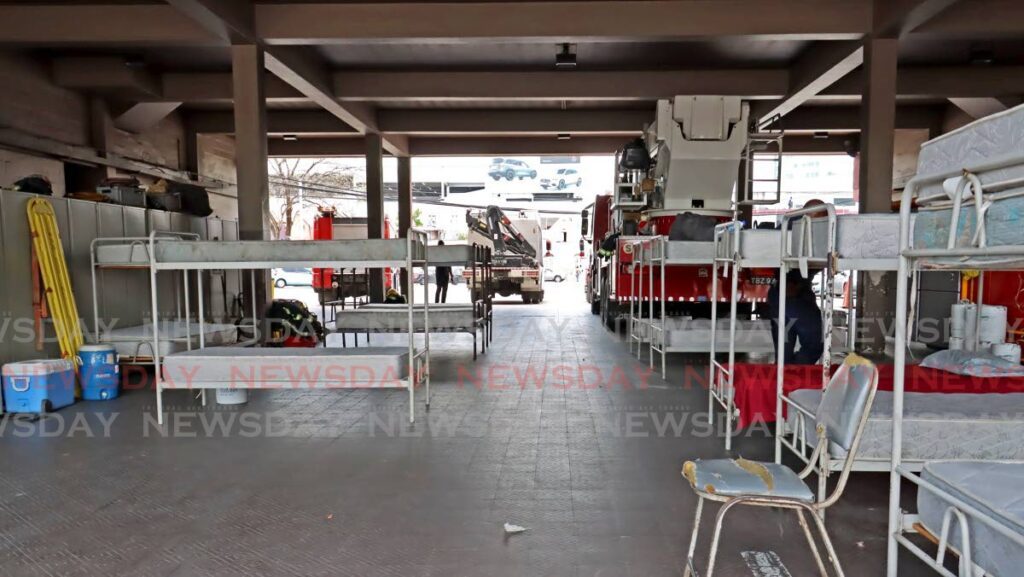Wrightson Road firefighters sleep with firetrucks

TRINIDAD and Tobago Fire Service officers stationed at its Wrightson Road Headquarters, on the night of April 23, moved their beds from their male dormitory to the appliance bay in protest against a lack of air conditioning (AC) in the dorm.
The appliance bay usually houses firetrucks and other firefighting equipment.
Contacted for comment on April 25, president of the Fire Association Keone Guy said officers had “reached their breaking point” after the fire service failed to address multiple complaints raised about faulty AC units, inadequate ventilation, and poor upkeep of the dormitory over the past seven months.
Guy said even though the appliance bay was used to store firefighting kits and exposed officers to suit fumes, they still viewed it as a “safer alternative to the dormitories, as officers were left with no other viable option...
“The combined capacity of both female and male dormitories at any given time is intended to accommodate 25-30 officers, however, during shift changes, this number surges to upwards of 60 individuals, putting a strain on already-cramped and inadequate living quarters.”
He said the problem was compounded by the lack of natural ventilation in the dorms, as windows and other openings were sealed off years ago to facilitate the installation of the AC units.
Guy said numerous reports had been filed.
“Complaints were escalated to the Ministry of National Security and the Occupational Health and Safety Board.”
He said reports were also lodged with the Public Health Department and Ministry of Health.
In a letter to the county medical officer of health, Guy wrote, “Officers have reason to believe the physical condition of the station is likely to endanger their health.
“Toilet effluvia (odour) is venting into the dormitory. The area is completely sealed from natural ventilation and the air-conditioning system has been inoperable for several months.”
Additionally, the letter claimed there was mould on surfaces in the male dormitories.
“There is evidence of the proliferation of a possible bio-contaminate in the form of an unidentified mould-like substance present on several surfaces within the space.”
However, when contacted for comment on April 25, divisional fire officer and fire services public relations officer Dexter Hodge expressed reservations about the officers’ decision to move into the appliance bay. He suggested alternative measures should have been explored.
“Officers are subjected to constant noise pollution and dust from passing traffic, thereby worsening their already-compromised living conditions,” Hodge said.
Acknowledging the AC malfunction, he said steps were being taken to rectify the issue promptly.
“The technicians are here today and the parts to have the units repaired are en route.”
Technicians responsible for maintaining the air-conditioning units had previously cited difficulties in acquiring the necessary parts.
But Guy said apart from accommodation challenges, the absence of a bathroom custodian (janitor) made it difficult for officers to maintain hygiene standards.
“A custodian has not been assigned in years.”
He said the responsibility of cleaning fell to the officers themselves, but they lacked the necessary supplies.
He added that despite efforts to engage the relevant authorities, including the Chief Fire Officer and the procurement department, little progress had been made.
The situation at the Wrightson Road headquarters joins a growing list of broader challenges faced by the fire services, including the lack of critical equipment and resources.
Speaking of the ongoing challenge of inadequate equipment in the Fire Service, Hodge emphasised its critical impact on firefighting strategies.
He said, “Officers are compelled to adopt a defensive approach, prioritising containment over direct intervention.”
He said firefighters should shift from an aggressive, “attack mode” firefighting technique – where officers engage fires at their source – to a more cautious stance aimed at preventing collateral damage and ensuring the safety of surrounding structures.
Hodge admitted, “The lack of equipment presents us with a significant challenge.”


Comments
"Wrightson Road firefighters sleep with firetrucks"